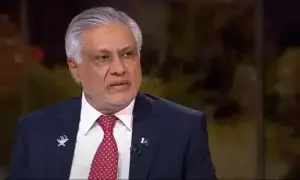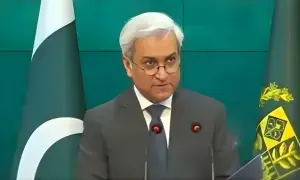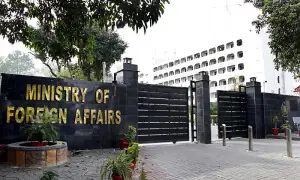White House official says Pakistan’s long-range missiles could threaten US
A senior White House official has issued a stark warning regarding Pakistan’s evolving military capabilities, asserting that the country is developing long-range ballistic missile systems that could potentially target locations beyond South Asia, including the United States.
Deputy National Security Adviser Jon Finer made the comments during a speech at the Carnegie Endowment for International Peace, highlighting the deteriorating relationship between Washington and Islamabad since the US withdrawal from Afghanistan in 2021.
Finer emphasized that Pakistan is advancing its missile technology, which could shift the focus of its nuclear capabilities from deterring India—its traditional adversary—to posing a broader threat. “Pakistan is pursuing increasingly sophisticated missile technology,” he stated, noting the development of larger rocket motors that could enhance their strike capabilities.
“Pakistan will have the capability to strike targets well beyond South Asia, including in the United States,” Finer said.
The number of nuclear-armed states with missiles that can reach the US homeland “is very small and they tend to be adversarial,” he continued, naming Russia, North Korea and China.
“So, candidly, it’s hard for us to see Pakistan’s actions as anything other than an emerging threat to the United States,” Finer said.
His remarks followed Washington’s announcement of new sanctions linked to Pakistan’s ballistic missile development program, which for the first time included measures against the state-run defense agency managing the program.
The Pakistani embassy did not respond immediately to a request for comment. Islamabad views its nuclear and missile capabilities as deterrents against Indian aggression and a means to ensure regional stability. Two senior US officials, speaking anonymously, noted that concerns about Pakistan’s missile program have been ongoing, particularly regarding the size of the rocket engines being developed.
One official indicated that the potential threat to the United States could arise within a decade. The officials stated that Finer’s comments aimed to encourage Pakistani officials to explain their development of more powerful rocket engines, which they have declined to address.
“They don’t acknowledge our concerns. They tell us we are biased,” the second US official said, adding that Pakistani officials have wrongly implied that US sanctions on their missile program are intended “to handicap their ability to defend against India.”
Finer identified himself as one of several senior US officials who have consistently expressed concerns about Pakistan’s missile program to high-ranking Pakistani officials, but to no avail. He pointed out that Washington and Islamabad have historically been “long-time partners” in areas such as development, counter-terrorism, and security. This situation raises further questions about Pakistan’s motivations for developing capabilities that could potentially be used against the US.
Pakistan has criticized the strong ties that US President Joe Biden has cultivated with its longstanding rival, India, while maintaining close relationships with China. Some Chinese entities have faced US sanctions for their involvement in supporting Pakistan’s ballistic missile initiatives. Since conducting its first nuclear test in 1998—over two decades after India—Pakistan has developed a significant arsenal of ballistic missiles capable of carrying nuclear warheads. According to the Bulletin of the American Scientists, Pakistan possesses approximately 170 nuclear warheads.
Read more
US imposes sanctions on suppliers to Pakistan’s ballistic missile programme
US reaffirms denial of support for Pakistan’s ballistic missile program
Pakistan Navy conducts successful flight test of ship launched ballistic missile
US-Pakistan relations have seen considerable fluctuations, from close Cold War collaboration against the Soviet occupation of Afghanistan to Pakistan’s crucial role in the US campaign against al Qaeda post-September 11, 2001. Pakistan has been designated a major non-NATO ally since 2004. However, relations have been strained by military coups, support for the Taliban during its rule from 1996 to 2001, and its nuclear weapons development.
Experts noted that Finer’s remarks came as a significant surprise. Michael Kugelman from the Wilson Center stated, “For a senior US official to publicly connect concerns about proliferation in Pakistan to a potential direct threat to the US homeland is a mighty dramatic development.”
For the latest news, follow us on Twitter @Aaj_Urdu. We are also on Facebook, Instagram and YouTube.
















Comments are closed on this story.